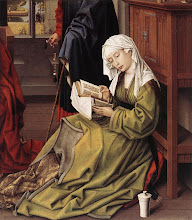St. Gregory quotes St. Paul,
"'He is our peace, for he has made both one.' Since we think of Christ as our peace, we may call ourselves true Christians only if our lives express Christ by our own peace. As the Apostle says: 'He has put enmity to death.' We must never allow it to be rekindled in us in any way but must declare that it is absolutely dead. Gloriously has God slain enmity, in order to save us; may we never risk the life of our souls by being resentful or by bearing grudges. We must not awaken that enmity or call it back to life by our wickedness, for it is better left dead. No, since we possess Christ who is peace, we must put an end to this enmity and live as we believe he lived. He broke down the separating wall, uniting what was divided, bringing about peace by reconciling in his single person those who disagreed."
The Big Book says
"Resentment is the 'number one' offender. It destroys more alcoholics than anything else. From it stem all forms of spiritual disease, for we have been not only mentally and physically ill, we have been spiritually sick."And again,
"It is plain that a life which includes deep resentment leads only to futility and unhappiness. To the precise extent that we permit these, do we squander the hours that might have been worth while. But with the alcoholic, whose hope is the maintenance and growth of a spiritual experience, this business of resentment is infinitely grave. We found that it is fatal. For when harboring such feelings we shut ourselves off from the sunlight of the Spirit. The insanity of alcohol returns and we drink again. And with us, to drink is to die. If we were to live, we had to be free of anger. The grouch and the brainstorm were not for us. They may be the dubious luxury of normal men, but for alcoholics these things are poison."Gregory says,
"In the same way, we must be reconciled not only with those who attack us from outside, but also with those who stir up dissension within; flesh then will no longer be opposed to the spirit, nor the spirit to the flesh. Once we subject the wisdom of the flesh to God's law, we shall be re-created as one single man at peace. Then, having become one instead of two, we shall have peace within ourselves. Now peace is defined as harmony among those who are divided. When, therefore, we end that civil war within our nature and cultivate peace within ourselves, we become peace. By this peace we demonstrate that the name of Christ, which we bear, is authentic and appropriate."
The Big Book also equates remorse with resentment, the dissension within: "Sometimes it was remorse and then we were sore at ourselves." More to the point I guess is the 3rd step: "Made a decision to turn our will and our lives over to the care of God as we understood Him." It is by this step that we "subject the wisdom of the flesh to God's law," and "end that civil war within our nature."
St. Gregory goes straight on to the 5th step: "When we reject the deeds of darkness and do everything in the light of day, we become light and, as light should, we give light to others by our actions." St. Paul says to the Ephesians, "Take no part in the fruitless works of darkness; rather expose them, for it is shameful even to mention the things done by them in secret; but everything exposed by the light becomes visible, for everything that becomes visible is light."
The Big Book says this about admitting our shortcomings:
"We pocket our pride and go to it, illuminating every twist of character, every dark cranny of the past. Once we have taken this step, withholding nothing, we are delighted. We can look the world in the eye. We can be alone at perfect peace and ease. Our fears fall from us. We begin to feel the nearness of our Creator. We may have had certain spiritual beliefs, but now we begin to have a spiritual experience.... We feel we are on the Broad Highway, walking hand in hand with the Spirit of the Universe."Bill Wilson didn't use mystical language like that easily, glibly. He meant it. I know, I have been there myself. The 12 and 12 uses similar language: "The dammed-up emotions of years break out of their confinement, and miraculously vanish as soon as they are exposed," and "this feeling of being at one with God and man, this emerging from isolation through the open and honest sharing of our terrible burden of guilt...."
The paradox is the same one that St. Paul saw, that St. Gregory saw, that AA sees so intensely: as long as the "deeds of darkness" remain hidden, they are "shameful even to mention"; but "everything exposed by the light ... becomes light." Confession transforms shame and guilt, makes them light. There is more: once our guilt has become light, it also sheds light for others. Self-satisfied piety does nothing to enlighten one's neighbors; what is enlightening is a humble awareness of one's own flaws, along with slowness to anger and quickness to forgive, and humble gratitude for the grace and mercy of God.
Whether you're an alcoholic, a teetotaller or anything in between, I highly recommend reading the Big Book (actually titled Alcoholics Anonymous): full text at http://www.aa.org/bigbookonline/ and the 12 & 12 (Twelve Steps & Twelve Traditions): as far as I know, not available online, but both books can be purchased from Amazon and many other sources.

No comments:
Post a Comment